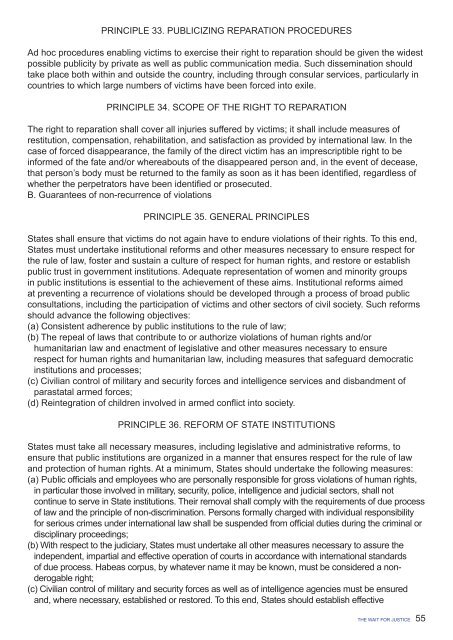The Commissioners of LLRC
The Commissioners of LLRC
The Commissioners of LLRC
You also want an ePaper? Increase the reach of your titles
YUMPU automatically turns print PDFs into web optimized ePapers that Google loves.
PRINCIPLE 33. PUBLICIZING REPARATION PROCEDURES<br />
Ad hoc procedures enabling victims to exercise their right to reparation should be given the widest<br />
possible publicity by private as well as public communication media. Such dissemination should<br />
take place both within and outside the country, including through consular services, particularly in<br />
countries to which large numbers <strong>of</strong> victims have been forced into exile.<br />
PRINCIPLE 34. SCOPE OF THE RIGHT TO REPARATION<br />
<strong>The</strong> right to reparation shall cover all injuries suffered by victims; it shall include measures <strong>of</strong><br />
restitution, compensation, rehabilitation, and satisfaction as provided by international law. In the<br />
case <strong>of</strong> forced disappearance, the family <strong>of</strong> the direct victim has an imprescriptible right to be<br />
informed <strong>of</strong> the fate and/or whereabouts <strong>of</strong> the disappeared person and, in the event <strong>of</strong> decease,<br />
that person’s body must be returned to the family as soon as it has been identified, regardless <strong>of</strong><br />
whether the perpetrators have been identified or prosecuted.<br />
B. Guarantees <strong>of</strong> non-recurrence <strong>of</strong> violations<br />
PRINCIPLE 35. GENERAL PRINCIPLES<br />
States shall ensure that victims do not again have to endure violations <strong>of</strong> their rights. To this end,<br />
States must undertake institutional reforms and other measures necessary to ensure respect for<br />
the rule <strong>of</strong> law, foster and sustain a culture <strong>of</strong> respect for human rights, and restore or establish<br />
public trust in government institutions. Adequate representation <strong>of</strong> women and minority groups<br />
in public institutions is essential to the achievement <strong>of</strong> these aims. Institutional reforms aimed<br />
at preventing a recurrence <strong>of</strong> violations should be developed through a process <strong>of</strong> broad public<br />
consultations, including the participation <strong>of</strong> victims and other sectors <strong>of</strong> civil society. Such reforms<br />
should advance the following objectives:<br />
(a) Consistent adherence by public institutions to the rule <strong>of</strong> law;<br />
(b) <strong>The</strong> repeal <strong>of</strong> laws that contribute to or authorize violations <strong>of</strong> human rights and/or<br />
humanitarian law and enactment <strong>of</strong> legislative and other measures necessary to ensure<br />
respect for human rights and humanitarian law, including measures that safeguard democratic<br />
institutions and processes;<br />
(c) Civilian control <strong>of</strong> military and security forces and intelligence services and disbandment <strong>of</strong><br />
parastatal armed forces;<br />
(d) Reintegration <strong>of</strong> children involved in armed conflict into society.<br />
PRINCIPLE 36. REFORM OF STATE INSTITUTIONS<br />
States must take all necessary measures, including legislative and administrative reforms, to<br />
ensure that public institutions are organized in a manner that ensures respect for the rule <strong>of</strong> law<br />
and protection <strong>of</strong> human rights. At a minimum, States should undertake the following measures:<br />
(a) Public <strong>of</strong>ficials and employees who are personally responsible for gross violations <strong>of</strong> human rights,<br />
in particular those involved in military, security, police, intelligence and judicial sectors, shall not<br />
continue to serve in State institutions. <strong>The</strong>ir removal shall comply with the requirements <strong>of</strong> due process<br />
<strong>of</strong> law and the principle <strong>of</strong> non-discrimination. Persons formally charged with individual responsibility<br />
for serious crimes under international law shall be suspended from <strong>of</strong>ficial duties during the criminal or<br />
disciplinary proceedings;<br />
(b) With respect to the judiciary, States must undertake all other measures necessary to assure the<br />
independent, impartial and effective operation <strong>of</strong> courts in accordance with international standards<br />
<strong>of</strong> due process. Habeas corpus, by whatever name it may be known, must be considered a nonderogable<br />
right;<br />
(c) Civilian control <strong>of</strong> military and security forces as well as <strong>of</strong> intelligence agencies must be ensured<br />
and, where necessary, established or restored. To this end, States should establish effective<br />
THE WAIT FOR JUSTICE 55


